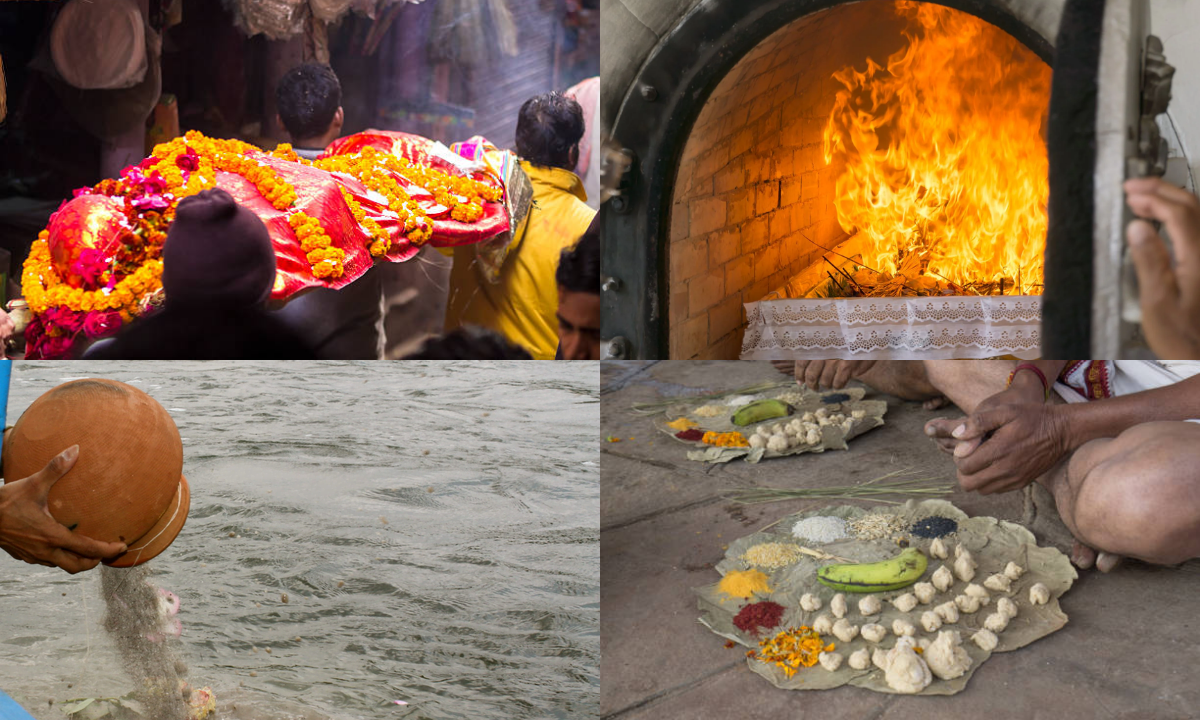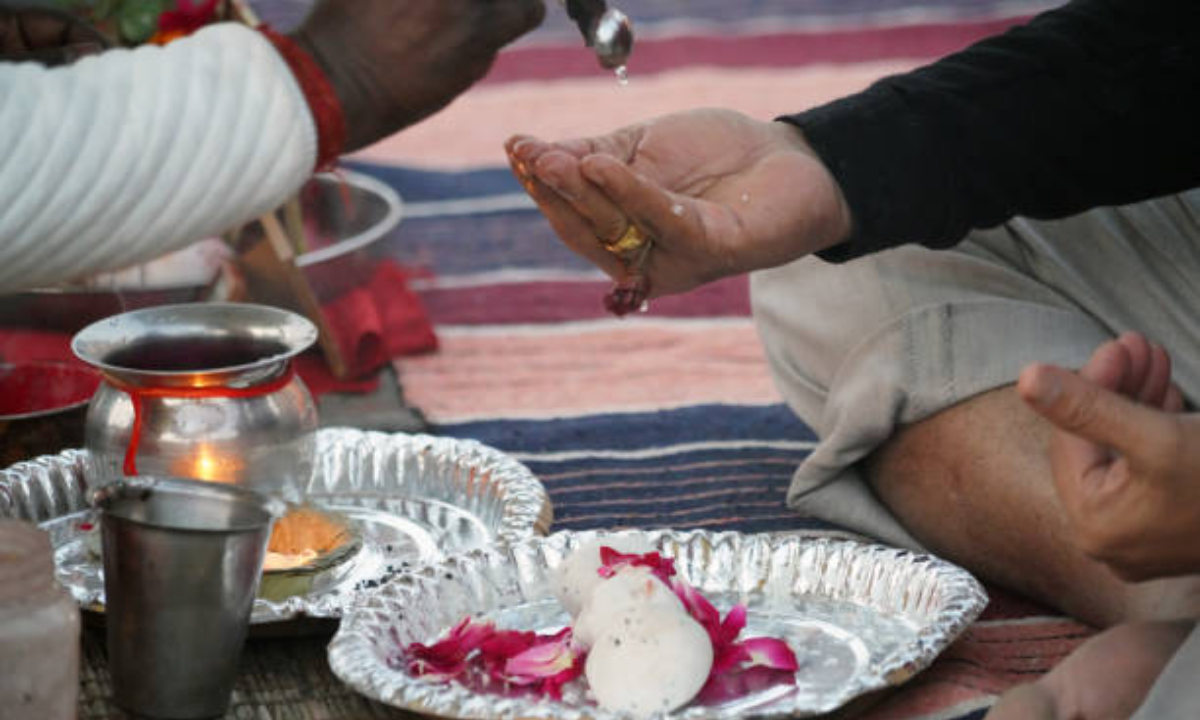All people must experience death since it is an ordinary part of living. Today, death marks the transition between the physical world and another realm rather than constituting the final event in Hindu beliefs. Cultural and spiritual beliefs are revealed through how religious and social groups manage their funeral processions. Hindu rituals after death preserve ancient traditions, uniting sacred beliefs with dutiful respect and blessings for a peaceful spiritual transition for the lost soul. The article examines both the value and procedure of funeral rites alongside the methods families use to achieve tranquility.
Concepts that Guide Typical Hindu Funeral Ceremonies

According to Hindu customs, most death rituals establish that a person’s eternal aspect continues while their physical body exists only for a brief period. According to Hindu scriptures, honouring the dead is not just a duty but a sacred act, helping the soul find release and peace. Each ritual, from cremation to the final food offering, guides the spirit away from earthly ties and towards the afterlife, reinforcing the bond between generations.
Such spiritual care lets family members concentrate on mourning while also retaining their memories of the deceased person.
The Final Journey: Entering the Smashan Bhumi
The funeral service starts at the Smashan Bhumi, known locally as the cremation ground. Friends and family members come together at this place to arrange the deceased body before its final funeral ceremonies. A male descendant conducts religious funeral ceremonies by adding fire to the woodpile and reciting sacred words during Indian cremation rituals. The release of the soul happens through this act as the spirit travels to another domain.
To perform a cremation, family members require professional services that deliver body transportation along with setup and coordination of rites at the smashan bhumi cremation grounds. Funeral services in India serve an essential function by giving both guidance and help to execute traditional funeral rites during emotionally difficult moments.
The Role of the Priest for Funeral in the Ritual Process
A priest for a funeral is much more than a religious figure; he is the bridge between tradition and mourning families. His duties range from chanting the mantras to guiding every step of the rituals. The traditional customs for the proper execution of the process are verified by the priest to provide reassurance to family members.
The selection of a suitable priest for the funeral is recommended through cremation services to prevent any element from going unnoticed. Through spiritual support, family members can concentrate on the grieving process and maintain memories of their departed loved ones.
Pind Daan and the Importance of Spiritual Liberation
Among all Hindu post-death rituals Pind daan stands as one of the deepest religious components. The religious practice includes providing rice balls with water to the departed spirit while showing spiritual nourishment during their afterlife journey. People may carry out Pind daan rituals at sacred rivers and pilgrim sites because they guide souls toward spiritual peace and prevent rebirth cycles.
After consulting with a priest and cremating their deceased family member, the family will perform Pind daan near the riverbank, many days to weeks later. The practice forms an essential ritual of Indian death customs because it bonds relatives to deceased ancestors and ensures their divine care proceeds into their new existence.
Asthi Visarjan: Returning to the Elements
The conduct of cremation results in collected remains, which the Hindus identify as asthi. After performing asthi visarjan, families must submerge the cremated remains in sacred river waters like the Ganges or other holy bodies of water. According to tradition, the soul leaves the world fully to combine with natural elements.
Cremation services provide total aid for asthi visarjan executions because this practice holds a sacred position in traditional Hindu customs. The services help families locate holy sites before providing transportation, as well as assisting them with the eco-friendly requirements of the religious practice.
The Shraddha Ceremony: A Timeless Ritual of Remembrance
Hindu rituals after death do not end with cremation and immersion. The Shraddha ceremony is conducted on the 10th, 12th, or 13th day after death, depending on family tradition and regional custom.
Support Systems: Funeral and Cremation Services in India
During the Shraddha ceremony, families assemble with their community to pray for the departed soul and share blessings with others through charitable donations. Usually, a priest’s funeral, making sure all steps are followed, while Funeral services in India help with organising the gathering and preparation of offerings.
The emotional weight of loss can make even simple tasks overwhelming. This is where organised cremation services and Funeral services in India lend a hand. They not only ensure every ritual, from Smashan bhumi cremation to asthi visarjan, is handled with respect, but they also support the ongoing emotional needs of the family.
The professional services of cremation providers can handle both body preparation and pick-up, supply suitable funeral priests and organise the sacraments of Pind daan or Shraddha. Up-to-date funeral services combine traditional methods concerning help families navigate challenging moments during death.
Continuing Bonds: The Lasting Significance of Rituals
The importance of these rituals goes beyond the immediate period of mourning. Regular remembrance through annual Shraddha, visits to holy sites, and repeated offerings help family members feel connected to departed relatives across generations.
Such practices affirm values, build community, and make the loss a shared experience, not a lonely ordeal. Hindu rituals after death, including the solemnity of Pind daan and the care shown at every Smashan bhumi cremation, underscore the respect Hindus hold for the mystery of life and death.
Conclusion: Embracing Tradition in Times of Loss
In the end, Hindu rituals after death are not just customs—they are powerful tools for healing and honouring those we love. From the solemnities of cremation to the symbolic unity with nature in asthi visarjan, each ritual plays a vital role.
Through their commitment to knowledgeable priests for funeral rituals combined with ethical cremation services and compassionate funeral providers in India families convert moments of severe sadness into meaningful displays of enduring care. Developing sympathy through time shifts loss into continuous recollections which preserve past individuals’ blessings along with their memories across multiple generations.
As a respected Indian funeral services company Kaashimukthi provides solemn professional assistance for Hindu funeral rituals that include Smashan bhumi cremation and asthi visarjan and Shraddha ceremony organisation.

Madhu is an Entrepreneur, a Mentor, a Writer and an Aspiring Car Race Driver. He is Deeply passionate about leveraging Technology and Human Centred Design to make complex care and End of Life Planning easier. With the ultimate aim of Improving the quality of Life in the Twilight years. Madhu is highly educated and Alumni of IIM-Bangalore, Sikkim Manipal University and Bangalore University besides a Rich Industry Experience in the field of Product Management, Design, Supply chain, Finance, Commercial Management and Funeral Services.

